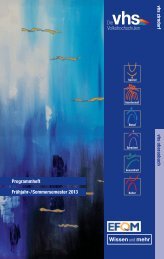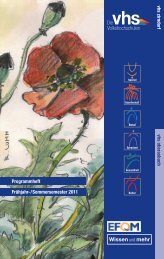Der NEUE Katalog ist da! - PRO PUBLIC GmbH
Der NEUE Katalog ist da! - PRO PUBLIC GmbH
Der NEUE Katalog ist da! - PRO PUBLIC GmbH
Create successful ePaper yourself
Turn your PDF publications into a flip-book with our unique Google optimized e-Paper software.
4<br />
Reagents<br />
Often the isolation of cells or of sub-cellular particles is<br />
the first step in gene expression research or in diagnostic<br />
examinations. Apart from the bio-specific separation<br />
methods physical separation methods are most commonly<br />
used. In these methods physical differences such as size<br />
and charge of the particles to be separated are utilised.<br />
For this purpose so-called separating solutions (= centrifugation<br />
media) are used.<br />
These media must comply with the following criteria:<br />
• They must be able to form a density gradient over the<br />
desired range<br />
• The desired pH value and the desired osmolality must<br />
be easily adjustable<br />
• The solutions must not be too viscous in case of high<br />
density<br />
• They must not cause any functional or morphological<br />
changes in biological materials<br />
• They must not penetrate biological membranes<br />
Our separating solution – Pancoll – are made from a neutral,<br />
highly cross-linked, hydrophilic polymer of sucrose<br />
with an average molecular weight of 400000 D.<br />
Powercoll cons<strong>ist</strong>s of a colloi<strong>da</strong>l suspension of silica particles,<br />
loaded with polyvinyl pyrrolidone (PVP).<br />
Storage: +2°C to ambient temperature<br />
With a proper storage separating solutions can be kept<br />
for at least 36 months.<br />
The storage period starts on the manufacturing <strong>da</strong>te.<br />
4.13<br />
Reagenzien<br />
Separating Agent Solution/Trennlösungen<br />
Pancoll and Powercoll/Pancoll und Powercoll<br />
Description/Beschreibung<br />
Die Isolierung von Zellen oder subzellulären Partikeln <strong>ist</strong><br />
häufig der erste Schritt bei der Erforschung der Gen-Expremierung<br />
oder bei diagnostischen Untersuchungen. Neben<br />
den biospezifischen Trennmethoden finden die physikalischen<br />
Trennmethoden am häufigsten Verwendung. Hierbei<br />
werden physikalische Unterschiede wie Größe und Ladung<br />
der zu trennenden Teilchen ausgenutzt.<br />
Dazu werden sogenannte Trennlösungen (= Zentrifugationsmedien)<br />
verwendet.<br />
Diese Medien müssen folgende Kriterien erfüllen:<br />
• Sie müssen einen Dichtegradienten über den gewünschten<br />
Bereich bilden können<br />
• <strong>Der</strong> gewünschte pH-Wert und die gewünschte Osmolalität<br />
müssen leicht einzustellen sein<br />
• Die Lösungen dürfen bei einer hohen Dichte nicht zu<br />
viskos sein<br />
• Sie dürfen keine funktionellen oder morphologischen<br />
Änderungen an biologischen Materalien hervorrufen<br />
• Sie dürfen biologische Membranen nicht durchdringen<br />
Unsere Trennlösung – Pancoll – wird aus einem neutralen,<br />
hoch vernetzten, hydrophilen Polymer der Sucrose mit einem<br />
durchschnittlichen Molekulargewicht von 400000 D<br />
hergestellt.<br />
Powercoll besteht aus einer kolloi<strong>da</strong>len Suspension von<br />
Silika-Partikeln, beladen mit Polyvinylpyrrolidon (PVP).<br />
Lagerung: +2° C bis Raumtemperatur<br />
Bei sachgerechter Lagerung sind Trennlösungen mindestens<br />
36 Monate haltbar.<br />
Die Haltbarkeitsfr<strong>ist</strong> beginnt ab Herstellungs<strong>da</strong>tum.<br />
Pancoll human, density/Dichte 1,077 g/ml 100 ml P04-60100<br />
500 ml P04-60500<br />
Pancoll mouse, density/Dichte 1,086 g/ml 100 ml P04-64100<br />
500 ml P04-64500<br />
Pancoll rat, density/Dichte 1,091 g/ml 100 ml P04-65100<br />
500 ml P04-65500<br />
Pancoll animal, density/Dichte 1,077 g/ml 100 ml P04-63100<br />
500ml P04-63500<br />
Pancoll monocytes, density/Dichte 1,068 g/ml 100 ml P04-68100<br />
500 ml P04-68500<br />
Pancoll Platelets, density/Dichte 1,063 g/ml 100 ml P04-67100<br />
500 ml P04-67500<br />
Powercoll, density/Dichte 1,077 g/ml 100 ml P04-61100<br />
500 ml P04-61500<br />
Powercoll, density/Dichte 1,124 g/ml 100 ml P04-62100<br />
500 ml P04-62500<br />
BIOTECH <strong>GmbH</strong>





